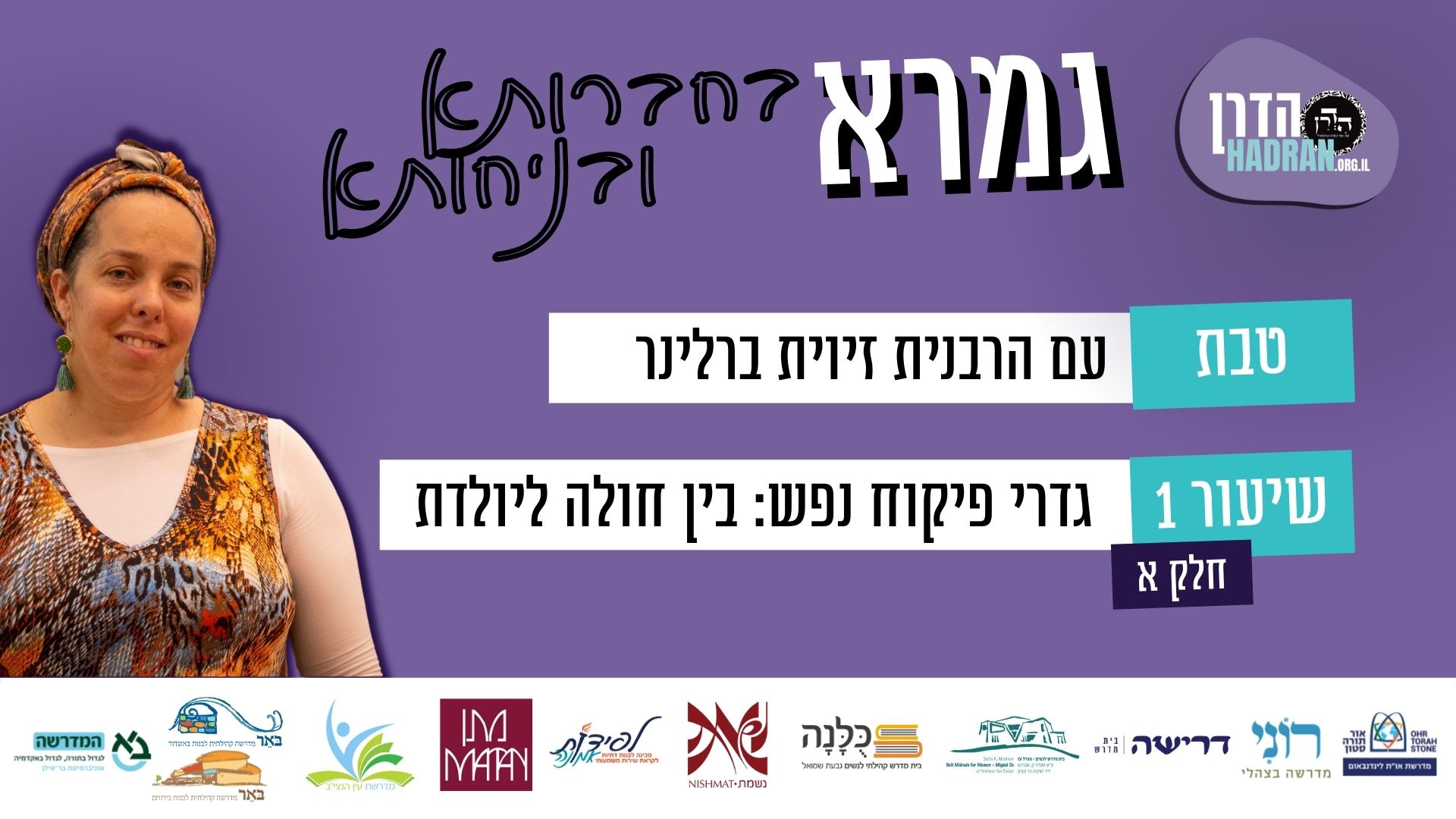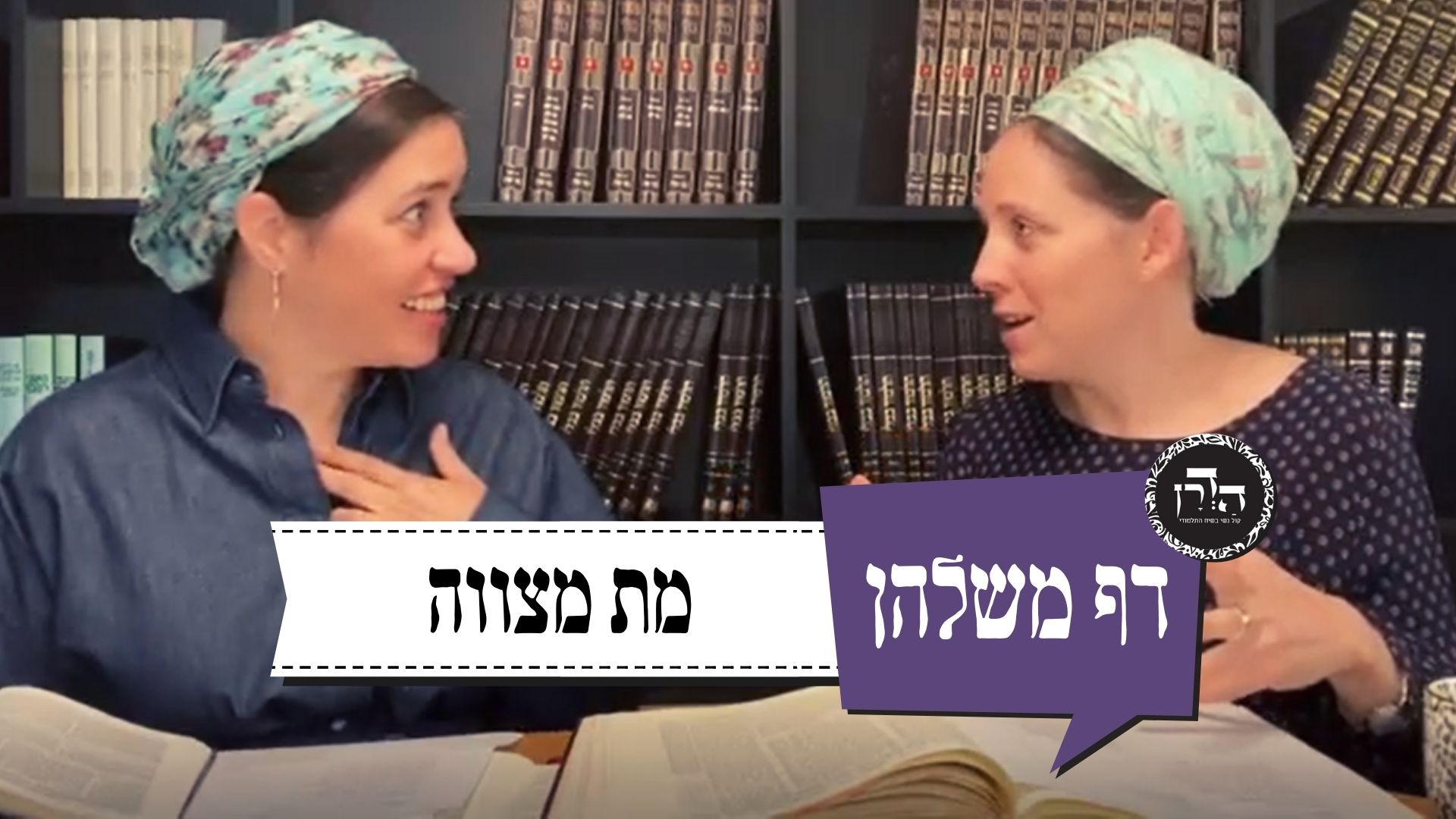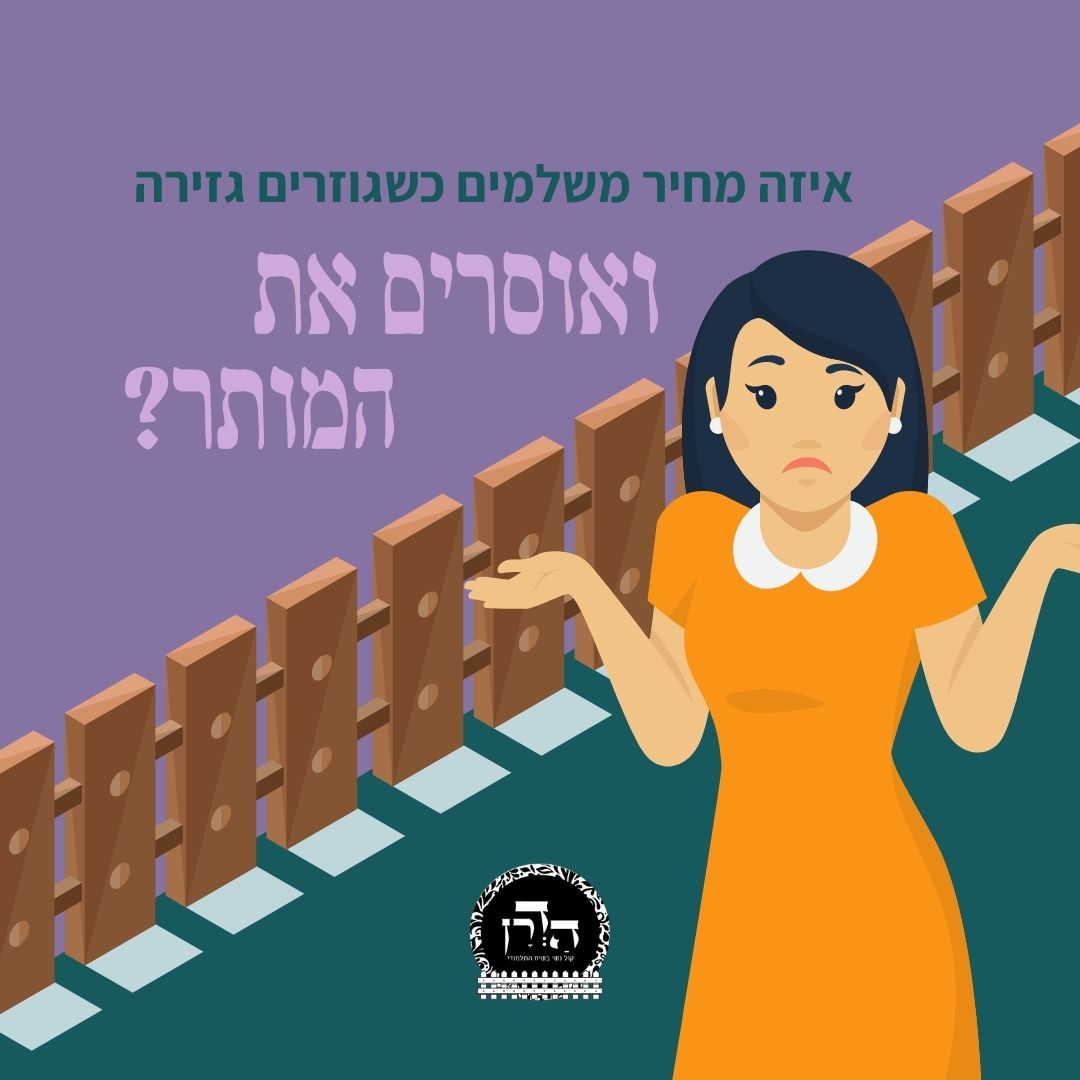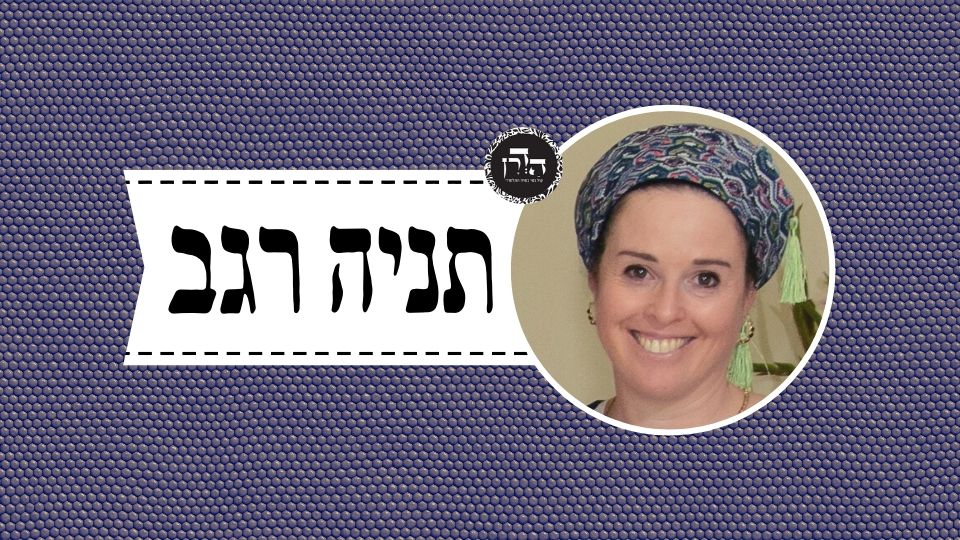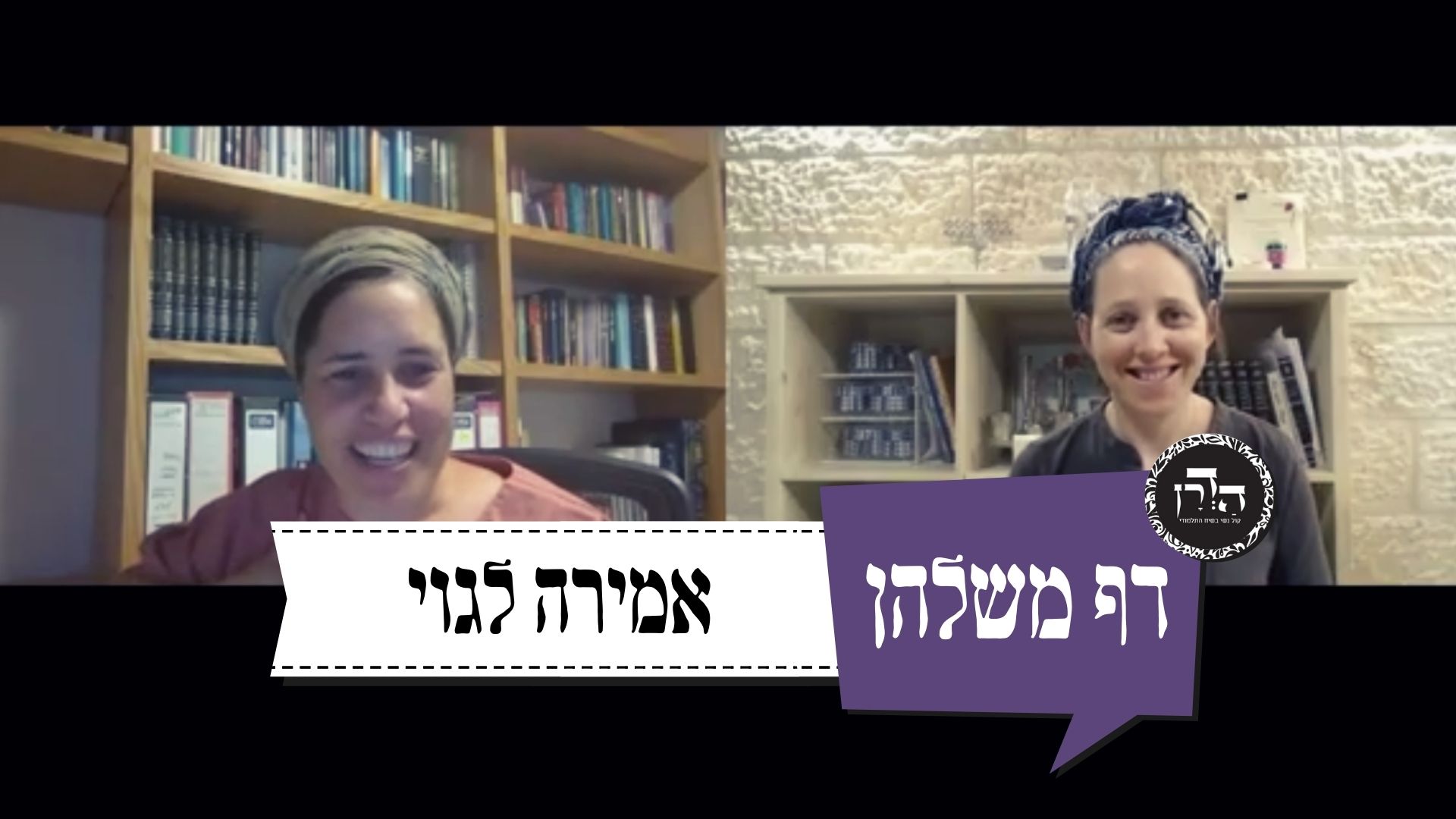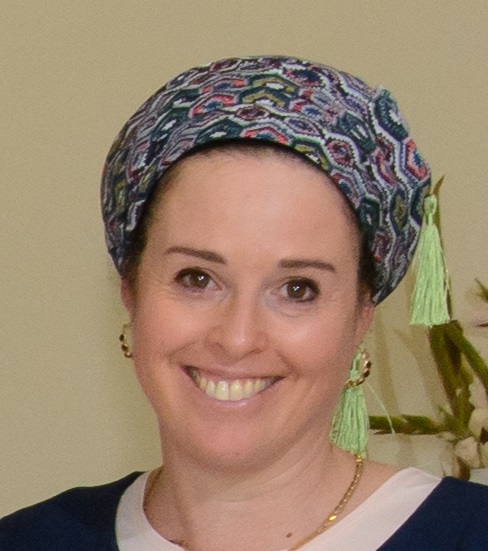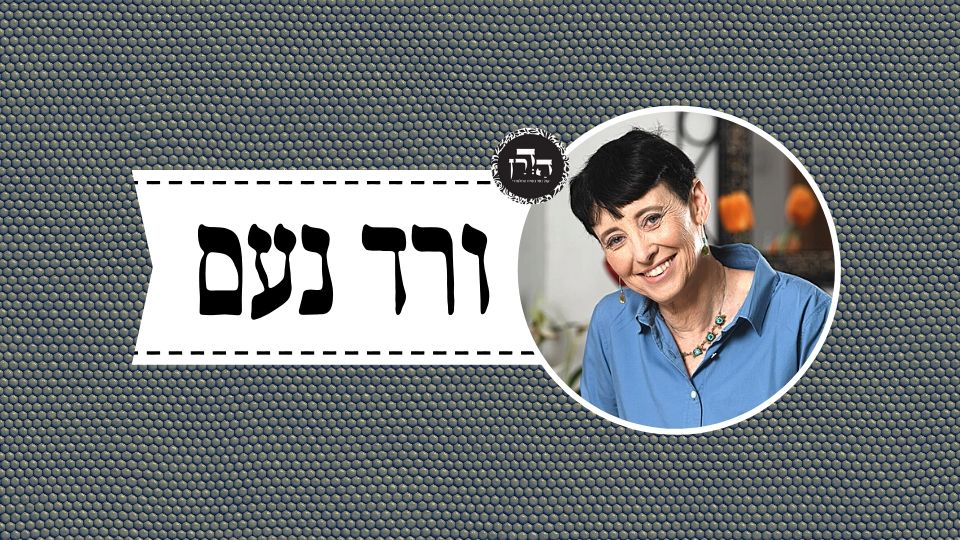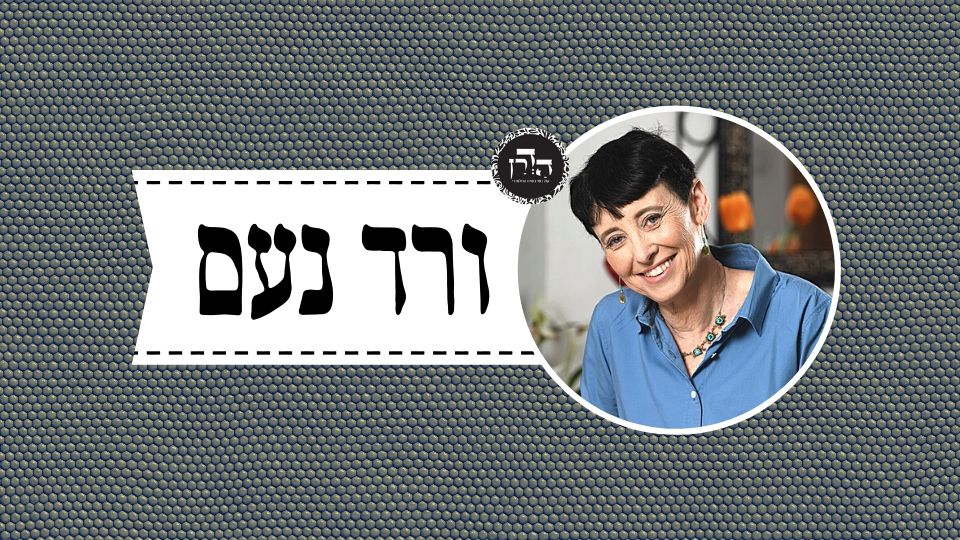המשנה מונה דברים שאסור לאשה מדאורייתא לצאת איתם בשבת. עולא קובע שזה בדיוק ההפך לאיש. הגמרא מביאה שני פירושים שונים להבין את הטעם לדברי עולא. למה אם יוצאים עם טבעת שיש עליה חותם, זה אסור מדאורייתא – הרי זה לא נחשב להוצאה כלאחר יד (בשינוי) כי היא לא מחזיקה את זה ביד? יש מחלוקת לגבי הוצאת כובלת (שקית עם תבלינים) וצלוחית של פיילטון (שמן אפרסמון). הגמרא דורשת פסוקים מעמוס שמתייחסים לשמן אפרסמון ומשם גם מגיעה לדרשות לפסוקים מישעיהו על חטאים של גברים ונשים בזמן בית ראשון.
הלימוד השבוע מוקדש לזכות ולשלום הַיְימׇנוֹט אֱמוּנָה בַּת באנצ’י (קָסָאוּ) בת 11 שנעלמה במקום מגוריה בצפת, לפני שנתיים, ביום ט”ז אדר תשפ”ד (25.2.24), ולא נודעו עקבותיה.
הלימוד השבוע מוקדש למען ביטחון המדינה, החיילים והאזרחים, ולמען חירותו של העם האיראני. שנזכה בקרוב שיתקיים בנו הפסוק: "לַיְּהוּדִים הָיְתָה אוֹרָה וְשִׂמְחָה וְשָׂשֹׂן וִיקָר”.
הלימוד השבוע מוקדש לזכות וְלִשְׁלוֹם הָיימָנוֹט אֱמוּנָה בַּת באנצ’י (קָסָאוּ), בת 11 שנעלמה במקום מגוריה בצפת, לפני שנתיים, ביום ט”ז אדר תשפ״ד (25.2.24), ולא נודעו עקבותיה. אנו מתפללים שֶׁתִּמָּצֵא וְתוּשַׁב לביתה במהרה!
רוצה להקדיש שיעור?

כלים
הלימוד השבוע מוקדש לזכות ולשלום הַיְימׇנוֹט אֱמוּנָה בַּת באנצ’י (קָסָאוּ) בת 11 שנעלמה במקום מגוריה בצפת, לפני שנתיים, ביום ט”ז אדר תשפ”ד (25.2.24), ולא נודעו עקבותיה.
הלימוד השבוע מוקדש למען ביטחון המדינה, החיילים והאזרחים, ולמען חירותו של העם האיראני. שנזכה בקרוב שיתקיים בנו הפסוק: "לַיְּהוּדִים הָיְתָה אוֹרָה וְשִׂמְחָה וְשָׂשֹׂן וִיקָר”.
הלימוד השבוע מוקדש לזכות וְלִשְׁלוֹם הָיימָנוֹט אֱמוּנָה בַּת באנצ’י (קָסָאוּ), בת 11 שנעלמה במקום מגוריה בצפת, לפני שנתיים, ביום ט”ז אדר תשפ״ד (25.2.24), ולא נודעו עקבותיה. אנו מתפללים שֶׁתִּמָּצֵא וְתוּשַׁב לביתה במהרה!
כלים
העמקה
רוצה להבין מה באמת קורה מתחת לפני השטח של הסוגיה?
שיעורים, פודקאסטים והרחבות של מיטב המורות שלנו יפתחו לך עוד זוויות וכיווני חשיבה.
חדשה בלימוד הגמרא?
זה הדף הראשון שלך? איזו התרגשות עצומה! יש לנו בדיוק את התכנים והכלים שיעזרו לך לעשות את הצעדים הראשונים ללמידה בקצב וברמה שלך, כך תוכלי להרגיש בנוח גם בתוך הסוגיות המורכבות ומאתגרות.
פסיפס הלומדות שלנו
גלי את קהילת הלומדות שלנו, מגוון נשים, רקעים וסיפורים. כולן חלק מתנועה ומסע מרגש ועוצמתי.
שבת סב
וְהָתַנְיָא, רַבִּי אוֹשַׁעְיָא אוֹמֵר: וּבִלְבַד שֶׁלֹּא יֹאחֲזֶנּוּ בְּיָדוֹ וְיַעֲבִירֶנּוּ אַרְבַּע אַמּוֹת בִּרְשׁוּת הָרַבִּים!
But wasn’t it taught in a baraita that Rabbi Oshaya says with regard to an amulet: As long as he does not hold it in his hand and carry it four cubits in the public domain? Apparently, even with regard to an amulet, there is a distinction between wearing it and carrying it.
[אֶלָּא] הָכָא בְּמַאי עָסְקִינַן — בִּמְחוּפֶּה עוֹר.
Rather, with what are we dealing here? With an amulet that is covered in leather. Since the writing itself is covered, the name of God is not degraded when the amulet is brought into the bathroom with him.
וַהֲרֵי תְּפִילִּין דִּמְחוּפּוֹת עוֹר, וְתַנְיָא: הַנִּכְנָס לְבֵית הַכִּסֵּא — חוֹלֵץ תְּפִילִּין בְּרִחוּק אַרְבַּע אַמּוֹת וְנִכְנָס.
The Gemara objects. There is writing on the scrolls of phylacteries, which is covered in the leather of boxes housing the scrolls, and nevertheless it was taught in a baraita: One who enters a bathroom while wearing phylacteries must remove the phylacteries at a distance of four cubits and only then enter. There is no halakhic difference whether or not the writing is covered.
הָתָם מִשּׁוּם שִׁין. דְּאָמַר אַבָּיֵי: שִׁין שֶׁל תְּפִילִּין הֲלָכָה לְמֹשֶׁה מִסִּינַי. וְאָמַר אַבָּיֵי: דָּלֶת שֶׁל תְּפִילִּין הֲלָכָה לְמֹשֶׁה מִסִּינַי. וְאָמַר אַבָּיֵי: יוֹד שֶׁל תְּפִילִּין הֲלָכָה לְמֹשֶׁה מִסִּינַי.
The Gemara rejects this: There, with regard to phylacteries, the prohibition to enter the bathroom is not due to the sacred writing on the scrolls inside the phylacteries. Rather, it is due to the letter shin that protrudes from the leather of the boxes housing the scroll in the phylacteries of the head, as Abaye said: The source of the requirement of the shin of the phylacteries is a halakha transmitted to Moses from Sinai. It is required by Torah law. And, Abaye said: The knot in the shape of the letter dalet in the straps of the phylacteries of the head is a halakha transmitted to Moses from Sinai. And, Abaye said: The letter yod of the phylacteries is a halakha transmitted to Moses from Sinai. It is due to those letters that one must safeguard the sanctity of the phylacteries and refrain from taking them into the bathroom.
וְלֹא בְּשִׁרְיוֹן וְלֹא בְּקַסְדָּא וְלֹא בְּמַגָּפַיִים.
We learned in the mishna: And he may neither go out with shiryon, nor with a kasda, nor with maggafayim. These terms were not understood, and therefore the Gemara explains them:
שִׁרְיוֹן — זַרְדָּא. קַסְדָּא — אָמַר רַב: סַנְוָארְתָא. מַגָּפַיִים — אָמַר רַב: פֻּזְמָקֵי.
Shiryon is a coat of mail [zerada], armor made of scales. Kasda: Rav said that it is a leather hat [sanvarta] worn under a metal helmet. Maggafayim: Rav said they are leg armor worn beneath the knee.
מַתְנִי׳ לֹא תֵּצֵא אִשָּׁה בַּמַּחַט הַנְּקוּבָה, וְלֹא בְּטַבַּעַת שֶׁיֵּשׁ עָלֶיהָ חוֹתָם, וְלֹא בְּכוֹלֵיאָר, וְלֹא בְּכוֹבֶלֶת, וְלֹא בִּצְלוֹחִית שֶׁל פִּלְיָיטוֹן.
MISHNA: A woman may neither go out to the public domain with a perforated needle, i.e., a standard needle with an eye, nor with a ring that has a seal on it, nor with a kulyar, nor with a kovelet, the identity of which will be discussed in the Gemara, nor with a flask of balsam oil.
וְאִם יָצְתָה — חַיֶּיבֶת חַטָּאת, דִּבְרֵי רַבִּי מֵאִיר. וַחֲכָמִים פּוֹטְרִין בְּכוֹבֶלֶת וּבִצְלוֹחִית שֶׁל פִּלְיָיטוֹן.
And if she did go out into the public domain, she is liable to bring a sin-offering; this is the statement of Rabbi Meir, who holds that in doing so she violated the Torah prohibition of carrying a burden in the public domain on Shabbat. And the Rabbis exempt one who goes out on Shabbat with a kovelet and with a flask of balsam oil. In their opinion, these are ornaments, and therefore they do not fundamentally violate the Torah prohibition of carrying in the public domain on Shabbat.
גְּמָ׳ אָמַר עוּלָּא וְחִילּוּפֵיהֶן בְּאִישׁ. אַלְמָא קָסָבַר עוּלָּא: כָּל מִידֵּי דַּחֲזֵי לְאִישׁ לָא חֲזֵי לְאִשָּׁה, וּמִידִּי דַּחֲזֵי לְאִשָּׁה לָא חֲזֵי לְאִישׁ.
GEMARA: With regard to that which we learned in the mishna that a woman may not go out on Shabbat with a ring that has a seal, and by inference that she may go out with a ring without a seal, Ulla said: And the reverse of these halakhot is true with regard to a man. A man who wears a ring with a seal in the public domain is exempt. However, if he wears a ring without a seal, he is liable to bring a sin-offering as it is not considered an ornament for a man. Based on that statement, the Gemara concludes: Apparently, Ulla holds that every object that is suitable for a man is not suitable for a woman, and an object that is suitable for a woman is not suitable for a man.
מֵתִיב רַב יוֹסֵף: הָרוֹעִים יוֹצְאִין בְּשַׂקִּין. וְלֹא הָרוֹעִים בִּלְבַד אָמְרוּ, אֶלָּא כָּל אָדָם. אֶלָּא שֶׁדַּרְכָּן שֶׁל הָרוֹעִים לָצֵאת בְּשַׂקִּין.
Rav Yosef raised an objection from the Tosefta: Shepherds may go out on Shabbat in garments made of sacks. And not with regard to the shepherds alone did the Sages say that they are permitted to go out in sacks on Shabbat; rather, any person may do so. However, the Sages taught the halakha with regard to shepherds because it is the standard practice of shepherds to go out in sacks. Apparently, although a sack is not a typical garment for most people, it is permitted even for one who is not a shepherd and would not generally wear it. Based on the same principle, although men do not generally wear women’s ornaments and women do not generally wear men’s ornaments, since occasionally a man might wear an ornament belonging to a woman or vice versa, each should be permitted to go out into the public domain with the ornament of the other.
[אֶלָּא] אָמַר רַב יוֹסֵף: קָסָבַר עוּלָּא נָשִׁים עַם בִּפְנֵי עַצְמָן הֵן.
Rather, Rav Yosef said: Ulla holds that women are a people unto themselves. The difference between the standard practice of men and women is greater than the difference between the standard practice of practitioners of different professions.
אֵיתִיבֵיהּ אַבָּיֵי: הַמּוֹצֵא תְּפִילִּין — מַכְנִיסָן זוּג זוּג, אֶחָד הָאִישׁ וְאֶחָד הָאִשָּׁה. וְאִי אָמְרַתְּ נָשִׁים עַם בִּפְנֵי עַצְמָן הֵן, וְהָא מִצְוַת עֲשֵׂה שֶׁהַזְּמַן גְּרָמָא הוּא, וְכׇל מִצְוַת עֲשֵׂה שֶׁהַזְּמַן גְּרָמָא נָשִׁים פְּטוּרוֹת?
Abaye raised an objection to Rav Yosef’s statement from the Tosefta: One who finds phylacteries outside of the city on Shabbat should don them and bring them into the city one pair at a time. This applies to both a man and a woman. And if you say that women are a people unto themselves, isn’t the mitzva to don phylacteries a time-bound, positive mitzva, as there are times when the mitzva to don phylacteries is not in effect? And the following is a halakhic principle: Women are exempt from every time-bound, positive mitzva. If, in fact, the clothing and ornaments of a man are not suitable for a woman under any circumstances, why is a woman permitted to don the phylacteries and bring them into the city on Shabbat? Shouldn’t that be considered a prohibited act of carrying?
הָתָם קָסָבַר רַבִּי מֵאִיר: לַיְלָה זְמַן תְּפִילִּין הוּא, וְשַׁבָּת זְמַן תְּפִילִּין הוּא. הָוֵה לֵיהּ מִצְוַת עֲשֵׂה שֶׁלֹּא הַזְּמַן גְּרָמָא, וְכׇל מִצְוַת עֲשֵׂה שֶׁלֹּא הַזְּמַן גְּרָמָא — נָשִׁים חַיָּיבוֹת.
The Gemara answers: There, with regard to phylacteries, Rabbi Meir holds that night is an appropriate time to don phylacteries, and Shabbat and Festivals are similarly an appropriate time to don phylacteries. Consequently, the mitzva of phylacteries is a positive mitzva that is not time bound; and in every positive mitzva that is not time bound, women are obligated. Therefore, women are permitted to don the phylacteries and bring them into the city.
וְהָא הוֹצָאָה כִּלְאַחַר יָד הִיא!
With regard to Rabbi Meir’s ruling in the mishna that a woman is liable by Torah law if she goes out into the public domain wearing a ring with a seal, the Gemara asks: Isn’t it considered carrying out in a backhanded manner? A ring with a seal is not an ornament for a woman; it is an object like any other. One typically carries objects holding them in his hand. Wearing an object around one’s finger is atypical. There is no Torah prohibition violated when a labor is performed in an atypical manner.
אָמַר רַבִּי יִרְמְיָה: בָּאִשָּׁה גִּזְבָּרִית עָסְקִינַן. אָמַר רַבָּה בַּר בַּר חָנָה אָמַר רַבִּי יוֹחָנָן: תֵּרַצְתָּ אִשָּׁה, אִישׁ מַאי אִיכָּא לְמֵימַר?
Rabbi Yirmeya said that we are dealing in the mishna with a woman who is a treasurer for charity. A woman with that occupation typically wears a ring with a seal on her finger in order to perform her job. She does not, though, wear it as an ornament. Rabba bar bar Ḥana said that Rabbi Yoḥanan said: You answered and explained why, in the case of a woman, she would be liable to bring a sin-offering. However, in the case of a man who wore a ring without a seal, what is there to say? Why should he be liable?
אֶלָּא אָמַר רָבָא: פְּעָמִים שֶׁאָדָם נוֹתֵן לְאִשְׁתּוֹ טַבַּעַת שֶׁיֵּשׁ עָלֶיהָ חוֹתָם לְהוֹלִיכָהּ לַקּוּפְסָא, וּמַנִּיחָתָהּ בְּיָדָהּ עַד שֶׁמַּגַּעַת לַקּוּפְסָא. וּפְעָמִים שֶׁהָאִשָּׁה נוֹתֶנֶת לְבַעֲלָהּ טַבַּעַת שֶׁאֵין עָלֶיהָ חוֹתָם לְהוֹלִיכָהּ אֵצֶל אוּמָּן לְתַקֵּן, וּמַנִּיחָהּ בְּיָדוֹ עַד שֶׁמַּגִּיעַ אֵצֶל אוּמָּן.
Rather, Rava said that there is a different reason: Sometimes a person gives his wife a ring that has a seal on it to take it to his house and place it in a box for safekeeping, and, in order to ensure that she does not lose the ring, the woman places it in on her hand, i.e., on her finger, until she reaches the box. And, likewise, sometimes a woman gives her husband a ring that does not have a seal on it to take it to a craftsman to repair it, and the husband places it on his hand, i.e., on his finger, until he reaches the craftsman. The purpose of wearing these rings is not for ornamentation. Nevertheless, it is considered a typical manner of carrying them.
וְלֹא בְּכוֹלֵיאָר וְלֹא בְּכוֹבֶלֶת. מַאי כּוֹלֵיאָר? אָמַר רַב: מַכְבַּנְתָּא. כּוֹבֶלֶת — אָמַר רַב: חוּמַרְתָּא דְפִילוֹן. וְכֵן אָמַר רַב אַסִּי: חוּמַרְתָּא דְפִילוֹן.
We learned in the mishna: Nor with a kulyar, nor with a kovelet. The Gemara asks: What is a kulyar? Rav said: A brooch with which a woman fastens the collar of her garment. Kovelet: Rav said that it is a bundle of fragrant herbs [pilon]. And, similarly, Rav Asi said: A bundle of fragrant herbs.
תָּנוּ רַבָּנַן: לֹא תֵּצֵא בְּכוֹבֶלֶת, וְאִם יָצְתָה — חַיֶּיבֶת חַטָּאת, דִּבְרֵי רַבִּי מֵאִיר. וַחֲכָמִים אוֹמְרִים: לֹא תֵּצֵא, וְאִם יָצְתָה — פְּטוּרָה. רַבִּי אֱלִיעֶזֶר אוֹמֵר: יוֹצְאָה אִשָּׁה בְּכוֹבֶלֶת לְכַתְּחִלָּה.
The Sages taught in a baraita: A woman may not go out on Shabbat with a bundle of fragrant herbs, and if she did go out she is liable to bring a sin-offering, as she violated a Torah prohibition; this is the statement of Rabbi Meir. And the Rabbis say: She may not go out ab initio; however, if she went out, she is exempt. Rabbi Eliezer says: A woman may go out with a bundle of fragrant herbs even ab initio.
בְּמַאי קָמִיפַּלְגִי? רַבִּי מֵאִיר סָבַר מַשּׂאוֹי הוּא. וְרַבָּנַן סָבְרִי תַּכְשִׁיט הוּא, וְדִילְמָא שָׁלְפָא וּמַחְוְיָא, וְאָתְיָא לְאֵיתוֹיֵיהּ. וְרַבִּי אֱלִיעֶזֶר סָבַר: מַאן דִּרְכַּהּ לְמִירְמֵיהּ — אִשָּׁה שֶׁרֵיחָהּ רַע, אִשָּׁה שֶׁרֵיחָהּ רָע לָא שָׁלְפָא וּמַחְוְיָא, וְלָא אָתְיָא לְאֵתוֹיֵיהּ אַרְבַּע אַמּוֹת בִּרְשׁוּת הָרַבִּים.
The Gemara asks: With regard to what principle do they disagree? Rabbi Meir holds that it is a burden. Therefore, one who takes it out into the public domain on Shabbat is liable to bring a sin-offering. And the Rabbis hold that it is an ornament. Nevertheless, they prohibited going out with it ab initio due to concern lest she remove the bundle of herbs from its place, and show it to others, and come to carry it in the public domain. And Rabbi Eliezer holds: Whose practice is it to place fragrant herbs on herself? A woman whose odor is foul. But a woman whose odor is foul does not remove and show the bundle to others because, by doing so, her odor will be detected, a situation that she would prefer to avoid. And, therefore she will not come to carry it four cubits in the public domain.
וְהָתַנְיָא, רַבִּי אֱלִיעֶזֶר פּוֹטֵר בְּכוֹבֶלֶת וּבִצְלוֹחִית שֶׁל פְּלַיְיטוֹן!
This baraita cites the opinion of Rabbi Eliezer, who permits, even ab initio, going out into the public domain with a bundle of herbs. The Gemara asks: Wasn’t it taught in another baraita: Rabbi Eliezer exempts a woman who goes out on Shabbat with a bundle of herbs and with a flask of balsam oil? With regard to the halakhot of Shabbat, exempt means that although it is not prohibited by Torah law, it is prohibited ab initio by rabbinic law.
לָא קַשְׁיָא: הָא כִּי קָאֵי — אַדְּרַבִּי מֵאִיר. הָא כִּי קָאֵי — אַדְּרַבָּנַן. כִּי קָאֵי אַדְּרַבִּי מֵאִיר דְּאָמַר חַיָּיב חַטָּאת — אָמַר אִיהוּ פָּטוּר. כִּי קָאֵי אַדְּרַבָּנַן דְּאָמְרִי פָּטוּר אֲבָל אָסוּר — אָמַר אִיהוּ מוּתָּר לְכַתְּחִלָּה.
The Gemara answers: This is not difficult. When Rabbi Eliezer made this statement, it was when he was addressing the statement of Rabbi Meir. When Rabbi Eliezer made that statement, it was when he was addressing the statement of the Rabbis. To clarify: When he was addressing the statement of Rabbi Meir, who said that she is liable to bring a sin-offering, he said to him that she is exempt from bringing the sacrifice. When he was addressing the statement of the Rabbis, who said that she is exempt but it is prohibited ab initio, he said that it is permitted even ab initio.
וּמַאי רַבִּי מֵאִיר? דְּתַנְיָא: לֹא תֵּצֵא אִשָּׁה בְּמַפְתֵּחַ שֶׁבְּיָדָהּ, וְאִם יָצָאת — חַיֶּיבֶת חַטָּאת, דִּבְרֵי רַבִּי מֵאִיר. רַבִּי אֱלִיעֶזֶר פּוֹטֵר בְּכוֹבֶלֶת וּבִצְלוֹחִית שֶׁל פִּלְיָיטוֹן.
And to what statement of Rabbi Meir is the Gemara referring? As it was taught in a baraita: A woman may not go out on Shabbat with a key that is in her hand, and if she went out she is liable to bring a sin-offering; this is the statement of Rabbi Meir. Rabbi Eliezer exempts a woman who goes out with a bundle of fragrant herbs and with a flask of balsam oil [palyaton].
כּוֹבֶלֶת — מַאן דְּכַר שְׁמַהּ?
The Gemara finds the statement of Rabbi Eliezer difficult: A bundle of fragrant herbs; who mentioned anything about that? Rabbi Meir did not mention a bundle of herbs; why did Rabbi Eliezer mention it in his response?
חַסּוֹרֵי מִחַסְּרָא וְהָכִי קָתָנֵי: וְכֵן בְּכוֹבֶלֶת וְכֵן בִּצְלוֹחִית שֶׁל פִּלְיָיטוֹן לֹא תֵּצֵא, וְאִם יָצְאָה — חַיֶּיבֶת חַטָּאת, דִּבְרֵי רַבִּי מֵאִיר. רַבִּי אֱלִיעֶזֶר פּוֹטֵר בְּכוֹבֶלֶת וּבִצְלוֹחִית שֶׁל פִּלְיָיטוֹן. בַּמֶּה דְּבָרִים אֲמוּרִים — כְּשֶׁיֵּשׁ בָּהֶם בּוֹשֶׂם, אֲבָל אֵין בָּהֶם בּוֹשֶׂם — חַיֶּיבֶת.
The Gemara answers that the baraita is incomplete and it teaches the following: And likewise, with a bundle of fragrant herbs, and likewise with a flask of balsam oil she may not go out, and if she went out she is liable to bring a sin-offering; this is the statement of Rabbi Meir. Rabbi Eliezer exempts in the cases of a bundle of fragrant herbs and a flask of balsam oil. In what case is this statement said? In a case where the vessels have perfume in them; however, in a case where they do not have perfume in them, she is liable for carrying the flask out into the public domain on Shabbat.
אָמַר רַב אַדָּא בַּר אַהֲבָה: זֹאת אוֹמֶרֶת הַמּוֹצִיא אוֹכָלִין פָּחוֹת מִכְּשִׁיעוּר בִּכְלִי — חַיָּיב. דְּהָא אֵין בָּהּ בּוֹשֶׂם כְּפָחוֹת מִכְּשִׁיעוּר בִּכְלִי דָּמֵי, וְקָתָנֵי חַיֶּיבֶת.
Rav Adda bar Ahava said: That is to say that one who carries out a measure of food that is less than the measure that determines liability on Shabbat, but he does so in a vessel, he is liable. Although he is not liable for carrying the food out into the public domain, he is liable for carrying out the vessel. In that case, the vessel is not subordinate to the food, and therefore it is significant. Since the case of the flask in which there is no perfume is comparable to the case in which there is less than the required measurement of food in a vessel, and it was taught in the case of the flask that she is liable even though the fragrance of the perfume remains in the vessel, it stands to reason that one who carries a vessel containing less than a measure of food is also liable.
רַב אָשֵׁי אָמַר: בְּעָלְמָא אֵימָא לָךְ פָּטוּר, וְשָׁאנֵי הָכָא דְּלֵיתֵיהּ לְמַמָּשָׁא כְּלָל.
Rav Ashi said: That is no proof because, in general, I would say to you that he is exempt in a case where there is less than the measure that determines liability for food. However, it is different here, in the case of the empty flask of perfume as, in that case, there is no substance at all. Because the vessel is completely empty, he is liable for carrying the flask.
״וְרֵאשִׁית שְׁמָנִים יִמְשָׁחוּ״, אָמַר רַב יְהוּדָה אָמַר שְׁמוּאֵל: זֶה פִּלְיָיטוֹן.
Related to the mention of perfume, the Gemara cites several statements. It is stated: “That drink wine in mizrekei, and anoint themselves with the chief ointments; but they are not grieved for the hurt of Joseph” (Amos 6:6). Rav Yehuda said that Shmuel said: “The chief ointments” is balsam oil.
מֵתִיב רַב יוֹסֵף: אַף עַל פִּלְיָיטוֹן גְּזַר רַבִּי יְהוּדָה בֶּן בָּבָא, וְלֹא הוֹדוּ לוֹ. וְאִי אָמְרַתְּ, מִשּׁוּם תַּעֲנוּג, אַמַּאי לֹא הוֹדוּ לוֹ?
Rav Yosef raised an objection from the Tosefta: Rabbi Yehuda ben Bava issued a decree on balsam oil as well, prohibiting its use due to mourning over the destruction of the Temple, and the Sages did not agree with him. And if you say that balsam oil is the chief ointment cited in the verse, and the decree was issued due to the pleasure it provides, why didn’t the Sages agree with his decree? Doesn’t the verse criticize those who do not feel the pain of the people?
אֲמַר לֵיהּ אַבָּיֵי: וּלְטַעְמָיךְ, הָא דִּכְתִיב: ״הַשֹּׁתִים בְּמִזְרְקֵי יַיִן״ — רַבִּי אַמֵּי וְרַבִּי אַסִּי, חַד אָמַר קְנִישְׁקְנִין, וְחַד אָמַר שֶׁמְּזָרְקִין כּוֹסוֹתֵיהֶן זֶה לָזֶה. הָכִי נָמֵי דַּאֲסִיר? וְהָא רַבָּה בַּר רַב הוּנָא אִיקְּלַע לְבֵי רֵישׁ גָּלוּתָא וְאִישְׁתִּי בִּקְנִישְׁקְנִין, וְלָא אֲמַר לֵיהּ וְלָא מִידֵּי!
Abaye said to him: And according to your reasoning, that which is written in the same verse: “That drink wine in mizrekei”; Rabbi Ami and Rabbi Asi disagree over the meaning of the term mizrekei. One said: They are multi-spouted vessels [kenishkanin], wine vessels with spouts from which several people can drink at one time, and one said that they throw [mezarkin] their cups to one another in joy and jest. Is that also prohibited? Didn’t Rabba bar Rav Huna visit the house of the Exilarch and see the Exilarch drink from a multi-spouted vessel, and Rabba bar Rav Huna did not say anything to him?
אֶלָּא: כׇּל מִידֵּי דְּאִית בֵּיהּ תַּעֲנוּג וְאִית בֵּיהּ שִׂמְחָה — גְּזַרוּ רַבָּנַן, אֲבָל מִידֵּי דְּאִית בֵּיהּ תַּעֲנוּג וְלֵית בֵּיהּ שִׂמְחָה — לָא גְזַרוּ רַבָּנַן.
Rather, the principle is as follows: With regard to any matter in which there is an element of pleasure and in which there is an element of joy, the Sages issued a decree prohibiting it due to mourning over the destruction of the Temple. However, with regard to a matter in which there is an element of pleasure and in which there is no element of joy, the Sages did not issue a decree. Since there is no element of joy in balsam oil, even though it is precious and pleasurable, they did not issue a decree prohibiting it.
״הַשֹּׁכְבִים עַל מִטּוֹת שֵׁן וּסְרֻחִים עַל עַרְשׂוֹתָם״. אָמַר רַבִּי יוֹסֵי בְּרַבִּי חֲנִינָא: מְלַמֵּד שֶׁהָיוּ מַשְׁתִּינִין מַיִם בִּפְנֵי מִטּוֹתֵיהֶן עֲרוּמִּים.
The Gemara interprets additional verses related to the critique of the leadership of Samaria. It is stated: “That lie upon beds of ivory and stretch [seruḥim] upon their couches and eat the lambs out of the flock and the calves out of the midst of the stall” (Amos 6:4). Rabbi Yosei, son of Rabbi Ḥanina, said: This term, seruḥim, interpreted homiletically, teaches that their sin was that they would urinate before their beds while naked.
מְגַדֵּף בַּהּ רַבִּי אֲבָהוּ: אִי הָכִי, הַיְינוּ דִּכְתִיב: ״לָכֵן עַתָּה יִגְלוּ בְּרֹאשׁ גֹּלִים״ — מִשּׁוּם דְּמַשְׁתִּינִין מַיִם בִּפְנֵי מִטּוֹתֵיהֶם עֲרוּמִּים יִגְלוּ בְּרֹאשׁ גּוֹלִים?!
Rabbi Abbahu ridiculed that interpretation: If so, that this is the meaning of the term seruḥim, is this the meaning of that which is written: “Therefore now they shall go into exile at the head of the exiles and the revelry of those seruḥim shall pass away” (Amos 6:7), because they urinate before their beds while naked they will be exiled at the head of exiles? Although doing so is revolting, a punishment so severe is certainly excessive.
אֶלָּא אָמַר רַבִּי אֲבָהוּ: אֵלּוּ בְּנֵי אָדָם שֶׁהָיוּ אוֹכְלִים וְשׁוֹתִים זֶה עִם זֶה, וְדוֹבְקִין מִטּוֹתֵיהֶן זוֹ בָּזוֹ, וּמַחֲלִיפִין נְשׁוֹתֵיהֶן זֶה עִם זֶה, וּמַסְרִיחִין עַרְסוֹתָם בְּשִׁכְבַת זֶרַע שֶׁאֵינוֹ שֶׁלָּהֶן.
Rather, Rabbi Abbahu said: This verse is referring to a grave sin. These are people who would eat and drink with each other, and join their beds to each other, and swap wives with each other, and defile their beds with semen that was not theirs. That is the meaning of seruḥim upon their couches. For those severe transgressions they deserved to be exiled at the head of exiles.
אָמַר רַבִּי אֲבָהוּ, וְאָמְרִי לַהּ בְּמַתְנִיתָא תָּנָא: שְׁלֹשָׁה דְּבָרִים מְבִיאִין אֶת הָאָדָם לִידֵי עֲנִיּוּת, וְאֵלּוּ הֵן: הַמַּשְׁתִּין מַיִם בִּפְנֵי מִטָּתוֹ עָרוֹם, וּמְזַלְזֵל בִּנְטִילַת יָדַיִם, וְשֶׁאִשְׁתּוֹ מְקַלַּלְתּוֹ בְּפָנָיו.
On a related note, Rabbi Abbahu said, and some say it was taught in a baraita: Three matters bring a person to a state of poverty as a divine punishment from Heaven: One who urinates before his bed while naked, and one who demeans the ritual washing of the hands, and one whose wife curses him in his presence.
הַמַּשְׁתִּין מַיִם בִּפְנֵי מִטָּתוֹ עָרוֹם, אָמַר רָבָא: לָא אֲמַרַן אֶלָּא דְּמַהְדַּר אַפֵּיהּ לְפוּרְיֵיהּ, אֲבָל לְבָרַאי — לֵית לַן בַּהּ.
The Gemara explains: With regard to one who urinates before his bed while naked, Rava said: We only said this prohibition in a case where he turns his face toward his bed and urinates toward it; however, if he turns his face and urinates toward the outer portion of the room, we have no problem with it.
וּמַהְדַּר אַפֵּיהּ לְפוּרְיֵיהּ, נָמֵי לָא אֲמַרַן אֶלָּא לְאַרְעָא, אֲבָל בְּמָנָא — לֵית לַן בַּהּ.
And where one turns his face toward his bed, too, we only said this prohibition in a case where he urinates on the ground; however, if he urinates into a vessel, we have no problem with it since that is not considered disgusting.
וּמְזַלְזֵל בִּנְטִילַת יָדַיִם, אָמַר רָבָא: לָא אֲמַרַן אֶלָּא דְּלָא מְשָׁא יְדֵיהּ כְּלָל, אֲבָל מְשָׁא וְלָא מְשָׁא — לֵית לַן בַּהּ.
With regard to one who demeans the ritual washing of the hands, Rava said: We only said this statement in a case where he does not wash his hands at all; however, if he washes his hands and does not wash them with a significant amount of water, we have no problem with it.
וְלָאו מִלְּתָא הִיא, דְּאָמַר רַב חִסְדָּא: אֲנָא מְשַׁאי מְלֵא חָפְנַי מַיָּא וִיהַבוּ לִי מְלֵא חָפְנַי טֵיבוּתָא.
The Gemara notes: And that is not so, as Rav Ḥisda said: I wash my hands with handfuls of water and they gave me in reward handfuls of prosperity. Apparently, in order to garner the benefits of ritual washing of his hands, one should use a significant amount of water.
וְשֶׁאִשְׁתּוֹ מְקַלַּלְתּוֹ בְּפָנָיו, אָמַר רָבָא: עַל עִסְקֵי תַּכְשִׁיטֶיהָ. וְהָנֵי מִילֵּי הוּא דְּאִית לֵיהּ וְלָא עָבֵיד.
With regard to one whose wife curses him in his presence, Rava said: This is referring to a case where she curses him over matters relating to her ornaments, i.e., she complains that he does not provide her with jewelry. The Gemara comments: And that applies only when he has the resources to buy her jewelry but does not do so; however, if he does not have sufficient resources he need not be concerned.
דָּרֵשׁ רָבָא בְּרֵיהּ דְּרַב עִילָּאֵי, מַאי דִכְתִיב: ״וַיֹּאמֶר ה׳ יַעַן כִּי גָבְהוּ בְּנוֹת צִיּוֹן״ — שֶׁהָיוּ מְהַלְּכוֹת בְּקוֹמָה זְקוּפָה. ״וַתֵּלַכְנָה נְטוּיוֹת גָּרוֹן״ — שֶׁהָיוּ מְהַלְּכוֹת עָקֵב בְּצַד גּוּדָל. ״וּמְשַׂקְּרוֹת עֵינַיִם״ — דַּהֲוָה מָלְיָאן כּוּחְלָא לְעֵינַיְיהוּ וּמְרַמְּזָן. ״הָלוֹךְ וְטָפוֹף״ — שֶׁהָיוּ מְהַלְּכוֹת אֲרוּכָּה בְּצַד קְצָרָה. ״וּבְרַגְלֵיהֶן תְּעַכַּסְנָה״ — אָמַר רַב יִצְחָק דְּבֵי רַבִּי אַמֵּי: מְלַמֵּד שֶׁמַּטִּילוֹת מוֹר וַאֲפַרְסְמוֹן בְּמִנְעֲלֵיהֶן וּמְהַלְּכוֹת בְּשׁוּקֵי יְרוּשָׁלַיִם, וְכֵיוָן שֶׁמַּגִּיעוֹת אֵצֶל בַּחוּרֵי יִשְׂרָאֵל בּוֹעֲטוֹת בַּקַּרְקַע וּמַתִּיזוֹת עֲלֵיהֶם וּמַכְנִיסוֹת בָּהֶן יֵצֶר הָרָע כְּאֶרֶס בְּכָעוּס.
Since the Gemara spoke of sins in the First Temple era, it continues to explain other verses with similar content. Rava, son of Rav Ilai, interpreted the following verse homiletically. What is the meaning of that which is written: “The Lord says because the daughters of Zion are haughty and walk with outstretched necks and wanton eyes, walking and mincing as they go and making a tinkling with their feet” (Isaiah 3:16)?
“Because the daughters of Zion are haughty,” indicates that they would walk with upright stature and carry themselves in an immodest way.
“And walk with outstretched necks,” indicates that they would walk in small steps, heel to toe, so onlookers would notice them.
“Wanton eyes,” indicates that they would fill their eyes with blue eye shadow and beckon.
“Walking and mincing [tafof] as they go,” indicates that the wealthy women would walk a tall woman alongside a short one so that the tall woman would stand out. This is derived from the interchangeability of the letters tet and tzadi; tzafo, meaning, in this case, to be seen.
“Making a tinkling [te’akasna] with their feet,” Rabbi Yitzḥak from the school of Rabbi Ami said: This teaches that they would place myrrh and balsam in their shoes and would walk in the marketplaces of Jerusalem. And once they approached a place where the young men of Israel were congregated, they would stamp their feet on the ground and splash the perfume toward them and instill the evil inclination into them like venom of a viper [ke’eres bakhos].
מַאי פּוּרְעֲנוּתַיְהִי? — כִּדְדָרֵישׁ רַבָּה בַּר עוּלָּא: ״וְהָיָה תַחַת בֹּשֶׂם מַק יִהְיֶה״ — מָקוֹם שֶׁהָיוּ מִתְבַּשְּׂמוֹת בּוֹ נַעֲשָׂה נְמָקִים נְמָקִים. ״וְתַחַת חֲגוֹרָה נִקְפָּה״ — מָקוֹם שֶׁהָיוּ חֲגוּרוֹת בְּצִלְצוֹל נַעֲשָׂה נְקָפִים נְקָפִים. ״וְתַחַת מַעֲשֶׂה מִקְשֶׁה קׇרְחָה״ — מָקוֹם שֶׁהָיוּ מִתְקַשְּׁטוֹת בּוֹ נַעֲשָׂה קְרָחִים קְרָחִים. ״וְתַחַת פְּתִיגִיל מַחֲגֹרֶת שָׂק״ — פְּתָחִים הַמְּבִיאִין לִידֵי גִּילָה, יִהְיוּ לְמַחֲגֹרֶת שָׂק. ״כִּי תַחַת יֹפִי״ — אָמַר רָבָא, הַיְינוּ דְּאָמְרִי אִינָשֵׁי: חַלּוֹפֵי שׁוּפְרָא — כֵּיבָא.
What was their punishment for these sins? As Rabba bar Ulla taught: “And it shall come to pass that instead of a sweet smell, there shall be a stench; and instead of a belt, a rope; and instead of well-set hair, baldness; and instead of a fine dress, a girding of sackcloth; instead of beauty, a brand” (Isaiah 3:24).
He explains: “And it shall come to pass that instead of a sweet smell there shall be a stench,” indicates that the place that they would perfume became decaying sores.
“And instead of a sash, a rope [nikpe],” indicates that the place where they were girded with a sash became covered with many bruises [nekafim].
“And instead of well-set hair, baldness,” indicates that the place where they would style their hair became bald spots.
“And instead of a fine dress [petigil], a girding of sackcloth,” indicates that the orifices [petaḥim] that lead to pleasure [gil] will become a place for a girding of sackcloth.
“Instead of beauty, a brand [ki],” Rava said: That is the popular expression that people say: Instead of beauty, a sore [kiva].
״וְסִפַּח ה׳ קׇדְקֹד בְּנוֹת צִיּוֹן״ — אָמַר רַבִּי יוֹסֵי בְּרַבִּי חֲנִינָא: מְלַמֵּד שֶׁפָּרְחָה בָּהֶן צָרַעַת. כְּתִיב הָכָא ״וְשִׂפַּח״, וּכְתִיב הָתָם: ״לַשְׂאֵת וְלַסַּפַּחַת״.
With regard to a different verse: “The Lord will smite with a scab the crown of the head of the daughters of Zion and the Lord will lay bare their secret parts” (Isaiah 3:17). And the Lord will smite with a scab the crown of the heads of the daughters of Zion; Rabbi Yosei, son of Rabbi Ḥanina, said: This teaches that there was an outbreak of leprosy among them. It is written here, scab [sippaḥ], and it is written there, among the types of leprosy: “For a sore, and for a scab [sappaḥat], and for a bright spot” (Leviticus 14:56).
״וַה׳ פׇּתְהֵן יְעָרֶה״. רַב וּשְׁמוּאֵל, חַד אָמַר: שֶׁנִּשְׁפְּכוּ כְּקִיתוֹן, וְחַד אָמַר: שֶׁנַּעֲשׂוּ פִּתְחֵיהֶן כְּיַעַר.
With regard to the verse: And the Lord will lay bare their secret parts [pot’hen ye’areh], Rav and Shmuel disagree. One says: It means that they, i.e., their innards, were poured out [ye’areh] like a jug. And one says: That their orifices [pitḥeihen] were covered with hair as thick as a forest [ya’ar].
אָמַר רַב יְהוּדָה אָמַר רַב: אַנְשֵׁי יְרוּשָׁלַיִם אַנְשֵׁי שַׁחַץ הָיוּ. אָדָם אוֹמֵר לַחֲבֵרוֹ: בַּמֶּה סָעַדְתָּ הַיּוֹם? בְּפַת עֲמִילָה, אוֹ בְּפַת שֶׁאֵינָהּ עֲמִילָה? בְּיַיִן גּוֹרְדָּלִי, אוֹ
On the topic of the sins of Jerusalem and the abundance that existed before its destruction, Rav Yehuda said that Rav said: The people of Jerusalem were people of arrogance. They would couch their crude behavior in euphemisms. A person would say to another: On what did you dine today? Well-kneaded bread or bread that is not well-kneaded? On white wine or


